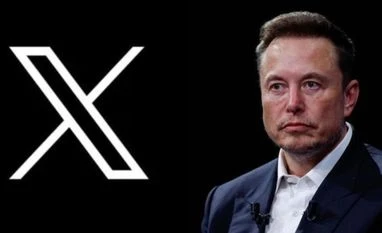The social media platform X, formerly known as Twitter, is reportedly worth almost 80 per cent less than it was two years ago when Elon Musk acquired it, according to recent estimates from investment giant Fidelity. This staggering drop in value has raised concerns about the platform’s future and its financial health under Musk's ownership.
From $44 billion to $9.4 billion: A steep decline
Musk took Twitter private in October 2022, after purchasing the platform for $44 billion. Since then, the company no longer trades publicly, but Fidelity continues to report on the value of its shares in X. According to Fidelity's latest disclosure, its shares in X were worth just $4.2 million at the end of August 2024. This represents a 24 per cent decline from the end of July and a dramatic 79 per cent drop from the $19.66 million Fidelity estimated those shares were worth in October 2022.
Based on this valuation, Fidelity implies that X is currently worth around $9.4 billion, a fraction of the price Musk paid to acquire the company. However, other investors may assess the platform differently.
Shrinking ad revenue and investor concerns
The steep drop in X's valuation, as noted by Fidelity, may reflect the platform’s declining ad revenue. Since going private, X no longer publishes quarterly financial metrics, making it difficult to gauge the company’s financial performance. However, analysts point to several indicators suggesting that the platform is struggling to attract advertisers.
"Musk clearly overpaid for this asset," Dan Ives, managing director and senior equity analyst at Wedbush Securities, was quoted as saying by CNN.
Ives estimated that X was worth around $30 billion when Musk acquired it and believes its value has dropped to approximately $15 billion today. While user engagement remains "strong," according to Ives, X is still facing significant ad pressure.
More From This Section
Under Musk’s leadership, advertisers have raised concerns about their brands being associated with extreme content. A recent global survey by Kantar found that 26 per cent of marketers plan to reduce their spending on X next year, marking the steepest cutback among major global ad platforms. Only 4 per cent of advertisers believe X offers "brand safety," compared to 39 per cent for Google.
X’s advertising challenges were compounded in November 2023 when Musk faced backlash from brands after endorsing an antisemitic conspiracy theory popular with White supremacists. Although Musk later apologised, calling it his "dumbest" social media post, he also told advertisers leaving the platform to "go f**k yourself."
X: A platform in transition
Despite the challenges, X remains a significant player in the social media landscape. The company reported 570 million monthly active users during the second quarter of 2024, an increase of 6 per cent from the previous year. However, data from Similarweb, a research firm, showed a decline in engagement on mobile devices. In August 2024, X had 73.5 million monthly active users on iOS and Android in the United States, down nearly 11 per cent year-on-year and 20 per cent from October 2022.
While US web traffic to X.com has dropped compared to Twitter.com before Musk’s acquisition, Similarweb noted that the platform’s traffic has performed better outside the United States.
Is X really worth less? Not everyone thinks so
Not all experts agree with Fidelity’s sharp valuation decline. Gene Munster, managing partner at Deepwater Asset Management, argues that Fidelity’s estimates may be overly pessimistic. “Fidelity was overly aggressive. They are essentially cleaning house on the investment,” Munster told CNN.
He believes that in the long run, X’s data will be more valuable than what Musk paid for Twitter. The data from X is currently being used to train Grok, an artificial intelligence (AI) chatbot developed by Musk’s AI startup, xAI. Munster sees Grok as a potential game-changer and Musk’s biggest future wealth source.
“When Musk bought Twitter, investors didn’t realise we’d be taking off on AI as fast as we are,” said Munster. “Musk buying Twitter is a case of better luck than smart," he added.
)